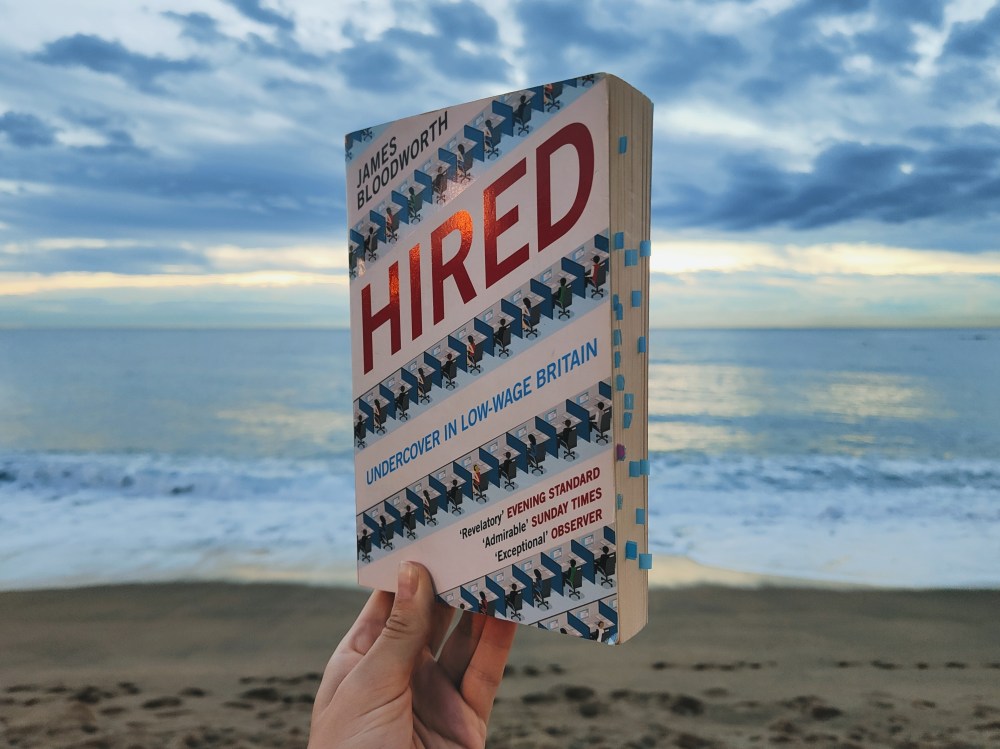I have become aware of “Hired” through one of the chapters within it, speaking about the author’s experience of working at an Amazon warehouse, which has been published as an article within The Guardian. Besides that, the book is divided into chapters accompanying the author through other badly remunerated jobs, such as being a care worker, an agent in a call center and an Uber driver. In my opinion, this should be a must-read before anyone should be allowed to use the aforementioned services. You want to order a package off of Amazon? You want to reach out to some customer service? You want to hire help at home for an older relative? Or you might need to get a cheap Uber to get to the airport? Read this book first!
Few of the people I would meet on my journey had the time to pontificate in the Guardian about their lifestyle. One of the reasons there are so few working-class authors today is precisely because a working-class job is typically incompatible with the sort of existence required to dash off books and articles. At a very basic level, a prerequisite to sitting down to quietly turn out 80,000 words is not having to worry about the electric being turned off or the discomfort of an empty stomach.
p. 5
What you’re getting yourself into is a grueling account of how those people occupying the work positions mentioned in the beginning, living their day to day life, trying to earn money and to survive. Going from “zero hour contracts”, to having to chase your employer to get paid, not having proper medical insurance, not being able to take sick leave, not being able to afford proper food or have the time to cook it and being treated in an inhumane way at one’s workplace. Especially the chapter about the work in an Amazon warehouse was as bad as you can imagine it. I really hope that it will make potential purchasers on the website reconsider getting their products elsewhere, supporting the local economy instead.
The place had an atmosphere of what I imagined a prison would feel like. […] You had to pass in and out of gigantic airport-style security gates at the end of every shift and each time you went on a break or needed to use the toilet. It could take ten or fifteen minutes to pass through these huge metal scanners. You were never paid for the time you spent waiting to have your pockets checked. […] Lunch […] marked the halfway point in a ten-and-a-half-hour shift.
p. 13
The author managed to highlight the many things that are so wrong with the current day society. It’s especially scary thinking how it might develop further in the future. Knowing that the majority of the population will need even more assistance living until a very advanced age in a couple of decades, we don’t seem to be ready for it at all. Care work sounds to be as far away as one could imagine it from being supportive and empathetic towards its patients/clients. The worst though is that local-level structures are completely disappearing and the work sector is becoming owned by giant agencies, dictating working conditions and their workers’ pay. When those that are making the most money in an economy don’t feed a part of it back into the local structures of where they are installed, that’s when you know this is not a state that can continue eternally.
At the time of writing, in 2017, Uber pays no VAT on booking fees by treating every driver as a separate business. By legally operating its app via a sister Dutch company, Uber also pays most of its corporation tax in the Netherlands rather than in UK. […] It classifies its divers not as its employees but as its customers, who are essentially paying a small commission on each fare in exchange for permission to use the company’s driving app.
p. 229
The only reason I reduced one ★ from the final rating was because the second chapter speaking about care work was much more superficial (and it made up almost a quarter of the entire book). There were less descriptions of the work itself and more accounts from people living in the town, not having anything to do with the care sector. But even with that in mind, I thought that the book was brilliant! An absolute suggestion to those, who are interested in understanding the current-day base of the job market. I don’t know whether the author would be able to gather up the courage and continue such an experiment working other badly paid jobs (thinking of food delivery services or Amazon delivery drivers, reminding me of the heart-breaking movie “Sorry We Missed You“) but I’ll surely be up for reading whatever he writes next!

★★★★☆ (4/5)
Edition: ISBN 978-1-78649-016-2
Atlantic Books, 2019 (Originally published in 2018)